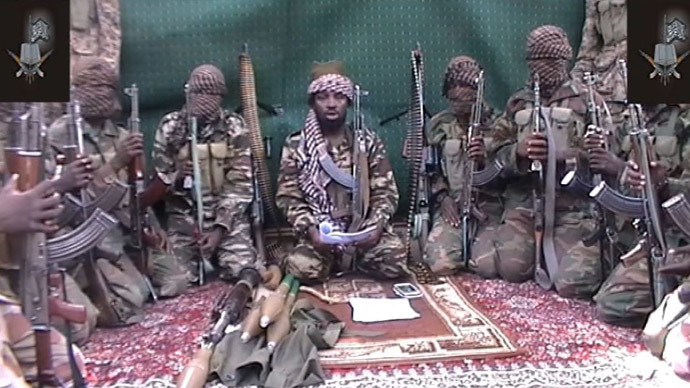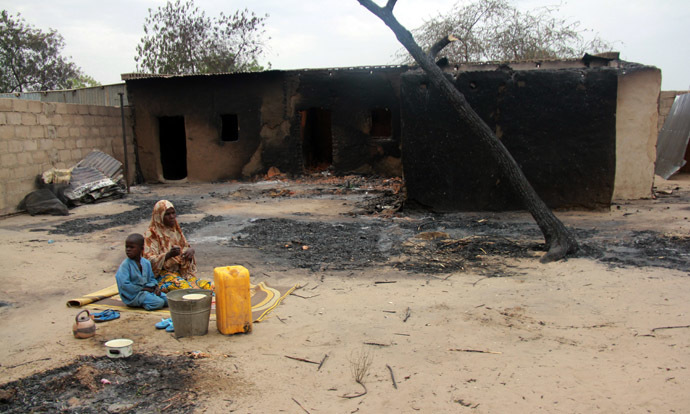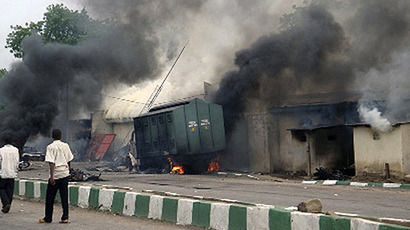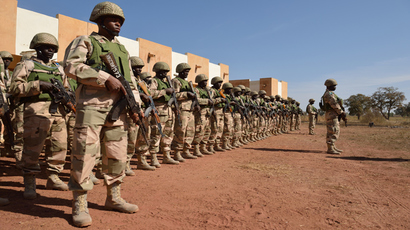Night massacre at Nigerian college leaves around 40 students dead

Around 40 students were killed in Nigeria’s north-east allegedly by militants from the extremist group Boko Haram. The well-armed insurgents broke into a college dorm at night and opened fire at young people while they were still asleep.
Soldiers recovered 42 bodies and transported 18 wounded students
to hospital, according to the latest report by AP, citing a
military intelligence official, who insisted on anonymity.
Earlier, the college’s principal, Idi Mato, suggested that as
many as 50 students could have been killed in the assault.
The attack on the agricultural college in rural Gujba of
Nigiria’s northeastern Yobe state began at 1am local time on
Sunday.
"Boko Haram terrorists… went into the school and opened fire
on students," the military spokesman in Yobe, Lazarus Eli,
told AFP.
The extremists rode into the college in two double-cabin pickup
all-terrain vehicles and on motorcycles, some dressed in Nigerian
military uniforms, according to AP citing a surviving student,
Ibrahim Mohammed. Witnesses say the extremists were apparently
aware of the college layout, as they left the female dormitories
intact.
"They came with guns around 1am (24:00 GMT) and went directly
to the male hostel and opened fire on them... The college is in
the bush so the other students were running around helplessly as
guns went off and some of them were shot down," Ahmed
Gujunba, a taxi driver who lives by the college told
Reuters.

Boko Haram is the Islamist group’s popular nickname, which
roughly means ‘Western education is forbidden’. The militant
organization’s official title is ‘The Congregation and People of
Tradition for Proselytism and Jihads’ and it has been fighting to
create an Islamic state in Nigeria’s north since 2009. The group
is notorious for targeting civilians.
It is the Islamists' third attack on a school in Nigeria's
northeastern state in four months. In July, a similar assault left 41 students and an English
teacher at a boarding school dead.
A state of emergency was declared in northeastern part of the
country on May 14, with thousands of government troops being sent
to the region. Following the most recent massacre, Ibrahim
Gaidam, governor of Yobe state, suggested that the military
crackdown was ineffective.
"Although there is [an] increase in troop movement and
military hardware deployment in the northeast, people are yet to
see the kind of action on the ground that effectively nips
criminal and terrorist activities in the bud," he said in a
statement.
Editor at Pan-African News Wire, Abayomi Azikiwe, told RT that extremism is fostered by poverty because it acts like a “breeding ground for extremists in Nigeria for groups like Boko Haram.” In order to try to fix the situation, “there needs to be a rethinking of distribution of wealth in Nigeria. There also needs to be a process of national reconciliation inside the country.”
Further conflict enables possible US involvement, argued Azikiwe. “The intervention from Islamic forces from around the world internationalizes the conflict. It also provides a rational and justification for deeper US intervention in Nigeria...which is of course the largest oil exporter out of Africa into the US.”
President Goodluck Jonathan on Sunday promised a change in
tactics concerning fight against extremists, not going into
detail though.
"When I declared a state of emergency things calmed down. Now
they are looking for soft targets ... If the drum is changing, we
must change step," he said as cited by Reuters. “I assure
Nigerians we'll do what is required to protect them."
The president compared the attack on the Nigerian college to last
week’s assault on a shopping mall in Kenya’s capital, which left 67
people dead. Boko Haram has said some of its fighters trained
with Al-Shabab in Somalia.
Ayo Johnson, founder of the Viewpoint Africa website, believes
the Nigerian attack is indicative of the general rise in Islamism
in Africa.

“All these groups are joined together, be it Al-Shabab in
Somalia or wider MNLA in Mali or MUJAWA [Movement for Unity and
Jihad in West Africa] across West Africa – all these jihadist
cells are blueprints of Al-Qaeda. Their focus is the same, their
ideology is the same. They also want to do the spectacular
attacks. They are always keen on grabbing the headlines,”
Johnson told RT.
Africa has been destabilized following a series of the Arab
spring revolutions there, according to Lawrence K. Freeman,
editor of Executive Intelligence Review magazine, who spoke to RT in June.
“And what they do know is that the overthrow of Colonel
Gaddafi, led by Obama and NATO, has been a catastrophe for North
and West Africa in supporting various elements that have now
allowed the destabilization of many of these countries,
especially with the arms and the flow of Tuaregs and terrorists
coming out of Libya,” Freeman said.
Meanwhile, an Islamist leader, Abubaker Shariff Ahmed, also known
as Makaburi (Graveyard), who allegedly recruited killers to the
group that massacred civilians at a mall in Nairobi warned in a
Saturday interview to The Daily Mail that the Westgate siege was
just the beginning of a series of attacks in revenge for Western
intervention in Muslim countries and that Britain was the next
target.













